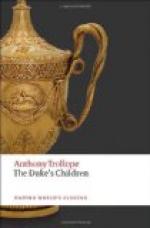‘But you do mean to fall in love with a rich one?’
’That remains to be seen, Lord Silverbridge. The rich man will at any rate have to fall in love with me first. If you know of any one you need not tell him to be too sure because he has a good income.’
’There’s Popplecourt. He’s his own master, and fool as he is, he knows how to keep his money.’
’I don’t want a fool. You must do better for me than Lord Popplecourt.’
‘What do you say to Dolly Longstaff?’
’He would be just the man, only he never would take the trouble to come out and be married.’
‘Or Glasslough?’
‘I’m afraid he’s cross, and wouldn’t let me have my own way.’
‘I can only think of one other;—but you would not take him.’
’Then you had better not mention him. It is no good crowding the list with impossibles.’
‘I was thinking of—myself.’
‘You are certainly one of the impossibles.’
‘Why, Lady Mab?’
’For twenty reasons. You are too young, and you are bound to oblige your father, and you are to be wedded to Parliament,—at any rate for the next ten years. And altogether it wouldn’t do,—for a great many reasons.’
‘I suppose you don’t like me well enough?’
’What a question to ask! No, my Lord I do not. There, that’s what you may call an answer. Don’t you pretend to look offended, because if you do, I shall laugh at you. If you may have your joke surely I may have mine.’
‘I don’t see any joke in it.’
’But I do. Suppose I were to say the other thing. Oh, Lord Silverbridge, you do me so much honour! And now I come to think about it, there is no one in the world I am so fond of as you. Would that suit you?’
‘Exactly.’
‘But it wouldn’t suit me. There’s papa. Don’t run away.’
‘It’s ever so much past five,’ said the legislator, ’and I had intended to be in the House more than an hour ago. Good-bye. Give my love to Miss Cassewary.’
’Certainly. Miss Cassewary is your most devoted friend. Won’t you bring your sister to see me some day?’
‘When she is in town I will.’
‘I should like to know her. Good-bye.’
As he hurried down to the House in a hansom, he thought over it all, and told himself that he feared it would not do. She might perhaps accept him, but if so, she would do it simply in order that she might become Duchess of Omnium. She might, he thought, have accepted him then, had she chosen. He had spoken plainly enough. But she had laughed at him. He felt that if she loved him, there ought to have been something of that feminine tremor, of that doubting, hesitating half-avowal of which he had perhaps read in novels, and which his own instincts taught him to desire. But there had been no tremor nor hesitating. ‘No; my Lord, I do not,’ she had said when he asked her to her face whether




